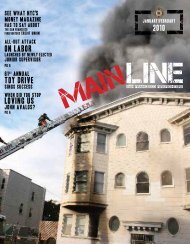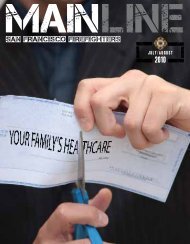Mainline - San Francisco Firefighters Local 798
Mainline - San Francisco Firefighters Local 798
Mainline - San Francisco Firefighters Local 798
You also want an ePaper? Increase the reach of your titles
YUMPU automatically turns print PDFs into web optimized ePapers that Google loves.
The Vannucchi Papers<br />
THE VANNUCCHI PAPERS<br />
BY: Jim Vannucchi, Secretary<br />
At the 2011 IAFF Legislative Conference<br />
discussing issues before the 111 th Congress,<br />
the matter of Social Security was<br />
widely discussed. The following language<br />
is from the IAFF:<br />
Social Security Issues<br />
An estimated 75 percent of all fire fighters<br />
are covered by pension plans that are<br />
independent of Social Security. These<br />
individuals participate in specialized fire<br />
fighter pension plans that have been designed<br />
to reflect the unique circumstances<br />
of their profession, including early retirement<br />
ages and high rates of disability.<br />
Additionally, many fire fighters who do<br />
not pay Social Security payroll taxes but<br />
qualify for Social Security benefits by paying<br />
into the program at a second job or<br />
through a spousal benefit may see their<br />
benefits reduced by two offsets, the Government<br />
Pension Offset (GPO) and the<br />
Windfall Elimination Provision (WEP).<br />
The GPO reduces public employees’ Social<br />
Security spousal or survivor benefits<br />
by two-thirds of their public pension<br />
while the WEP reduces the Social Security<br />
benefits of an individual who also<br />
receives a public pension from a job not<br />
covered by Social Security.<br />
Many proposals have been put forward<br />
in Congress in recent years to mandate<br />
Social Security coverage of all public<br />
employees, including fire fighters. Other<br />
bills, some of which have generated<br />
broad support, have sought to repeal or<br />
reform the GPO and WEP.<br />
The IAFF opposes mandatory Social Security<br />
coverage as an attack on fire fighter<br />
retirement security, and supports efforts<br />
to repeal or reform the WEP and GPO, so<br />
long as such actions would not result in<br />
mandatory Social Security coverage for<br />
fire fighters.<br />
BACKGROUND<br />
When the Social Security system was<br />
created in 1935, government employees<br />
were expressly excluded. Even when<br />
state and local governments were given<br />
the option to join the system in the<br />
1950s, many fire departments were still<br />
legally barred from electing Social Security<br />
coverage until 1994. Because of this<br />
long exclusion from the Social Security<br />
system, local governments created pension<br />
systems for fire fighters to address<br />
their retirement needs without Social<br />
Security. An estimated 75 percent of all<br />
fire fighters are covered by pension plans<br />
that are independent of Social Security.<br />
These comprehensive plans are tailored<br />
to meet the unique needs of fire fighters<br />
by taking into consideration the early retirement<br />
ages and high rates of disability<br />
retirement that are characteristic of public<br />
safety occupations.<br />
Many fire fighters who do not pay Social<br />
Security payroll taxes at their fire service<br />
job nevertheless qualify for Social Security<br />
benefits by paying into the program<br />
at a second job or through their spouse.<br />
These fire fighters may see their benefits<br />
reduced by one of two offsets: the Government<br />
Pension Offset (GPO), which reduces<br />
spousal benefits, and the Windfall<br />
Elimination Provision (WEP), which reduces<br />
the benefits of someone who paid<br />
a minimal amount into Social Security at<br />
a second job. The 110 th Congress has held<br />
hearings examining these offsets and the<br />
various bills that have been introduced to<br />
repeal or reform the WEP or GPO.<br />
IAFF POSITION<br />
The IAFF has long opposed mandatory<br />
Social Security coverage because it would<br />
jeopardize the specialized retirement systems<br />
created for fire fighters. The IAFF<br />
has also supported efforts to reform the<br />
WEP and GPO. Many policy makers argue<br />
that the two issues are linked, and they<br />
have proposed eliminating the offsets by<br />
requiring everyone to pay into Social Security.<br />
Proponents of linking the issues<br />
note that repealing the offsets would cost<br />
tens of billions of dollars, and claim that<br />
the fairest way to pay for any repeal or<br />
reform would be to collect Social Security<br />
taxes from those municipal employees<br />
not currently covered.<br />
To address the potential linkage of the<br />
two issues, delegates to the IAFF’s 2004<br />
convention modified the organization’s<br />
position to affirm that the IAFF supports<br />
repeal or reform of the GPO/WEP “provided<br />
it does not increase the likelihood<br />
of forcing all fire fighters into mandatory<br />
Social Security coverage.” This position<br />
was reaffirmed at the IAFF’s 2008 convention.<br />
The IAFF will work with congressional<br />
leaders and the new administration to<br />
both preserve independent retirement<br />
systems outside of the Social Security<br />
system and to lessen the impact of the<br />
GPO and WEP offsets on fire fighters who<br />
qualify for Social Security benefits.<br />
22 Main Line www.sffdlocal<strong>798</strong>.org











